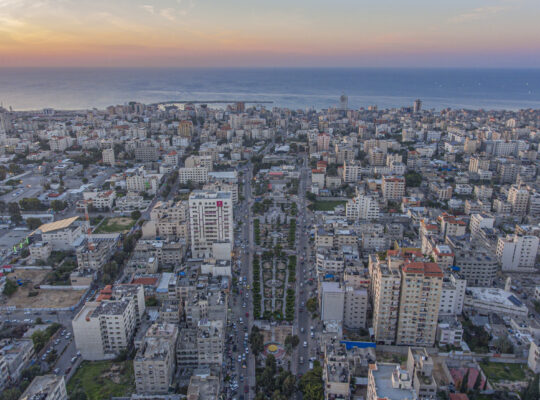[ad_1]
Residents of Lebanon are stocking up on food, fuel and emergency supplies as fears intensify that the Israel-Hamas war, now in its third week, will broaden and engulf them.
From the southern border with Israel to the capital Beirut, Lebanese are increasingly on edge and preparing for their worst-case scenario, which would see the Mediterranean country drawn into the spiralling conflict.
Some of those who can are fleeing abroad, or applying for visas to travel to neighbouring Turkey or the United Arab Emirates. Others have driven north to be as far from the Israeli frontier as possible. Hotels in the country’s northern mountains say they have been flooded with inquiries for long-term lets.
“I don’t want to wait for the first bombs to drop to get the hell out of Beirut,” said Aida Karam, 42, a hair stylist who has lived in the capital for almost two decades.
Israel and Lebanon-based militant groups have traded fire across the border on a near-daily basis since the assault on Israel by Hamas militants from Gaza on October 7.
The attack killed 1,400 Israelis, according to officials in the country, while more than 200 people were taken hostage. Israel responded by launching an aerial bombardment and siege of the coastal territory. The death toll in Gaza currently stands at more than 5,000, according to Palestinian officials.
The unfolding events have raised alarm among officials, diplomats and analysts that Hizbollah, the powerful Lebanese paramilitary force, and its patron Iran, could fully commit to the conflict. Hamas and Hizbollah have maintained close ties, with the latter providing training and expertise.
Karam, like many in the country, is a veteran of multiple wars fought on Lebanese soil, including the 1975-1990 civil war and the month-long conflict between Hizbollah and Israel in 2006. “For many of us, we started to panic as soon as the bombs dropped on Gaza, because we knew Hizbollah would inevitably get involved,” he said.

For now, the cross-border fire between Israeli forces, Palestinian militant groups in Lebanon and Hizbollah has been relatively constrained, according to analysts, with both sides taking pains to ensure responses stay proportional. But the low-grade exchange of artillery fire has been growing in intensity, with at least 25 Hizbollah fighters and some civilians killed.
Many of the foreign embassies in Lebanon have downsized to emergency staffing, while the US, UK and several EU states have recommended that their citizens leave Lebanon while commercial flights were still available.
Middle East Airlines, the national carrier, has halved its flight schedule because of changes to its insurance cover. It has also moved several of its planes to Turkey as part of its contingency planning.
As well as buying supplies of canned foods, medicines and bottled water, some parents had begun home-schooling their children, too nervous to be apart from them in case of an emergency.
“Things are heating up, but there’s still room for de-escalation,” said a Lebanese official. But he also worried that the lack of clearly defined red lines on either side meant there was ample room for a miscalculation that could lead to war. “The window for de-escalation is narrowing by the day,” the official said.
Sabre-rattling by both sides over the weekend only added to the panic, with Israeli prime minister Benjamin Netanyahu warning that Israel would strike Lebanon “with a force it cannot even imagine” if Hizbollah entered the fray.
Lebanon’s caretaker prime minister Najib Mikati has sought to reassure the nation that his government was sparing no efforts to maintain peace.
Emergency plans were in place and ministers had been briefed on their various responsibilities in case of war, Mikati said, while Lebanon’s “friends” overseas were taking steps to restore calm and prevent an escalation.
“I understand the feelings of fear and anxiety that afflict the Lebanese as a result of what is happening,” Mikati said on Sunday.
But throughout the country, his words rang hollow. Public trust in the government, which has operated in a caretaker capacity for more than a year amid an economic meltdown and political paralysis, was at rock bottom even before the Israel-Hamas war erupted. Faith that the prime minister will be able to rein in the pugilistic militant group is non-existent.
“Hizbollah is the decision maker here, not Mikati,” the official said.

In a country used to chaos, violence and political instability, people have quickly kicked into crisis mode, the cacophonous bustle replaced by an anxious hum. People are saying pre-emptive goodbyes, and cancelling weddings, parties and conferences.
Those living in areas close to the Hizbollah or Hamas political offices in Beirut have begun leasing flats in other parts of town, where landlords are exploiting the panic and raising rents.
Almost 10,000 people are now internally displaced, according to the UN’s migration agency, most from the towns and villages abutting the Israeli border which were severely damaged in the 2006 war.
Hassan Hammoud, the deputy head of crisis management in the city of Tyre, just 12 miles from the Israeli border, said a quarter of the 6,600 people who had streamed into the city in recent days had sought refuge in his unit’s makeshift shelters.
“Everyone in these shelters is terrified,” Hammoud said, noting that some of their homes had been hit by shelling before they fled.
“In 2006, the damage was terrible and the death toll was high, but based on what we’re hearing, this might be worse,” he said. “People are worried they won’t have homes to go back to whenever this conflict ends.”
[ad_2]
Source link


 JEWISH DIGITAL TIMES
JEWISH DIGITAL TIMES
